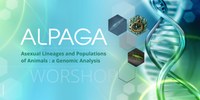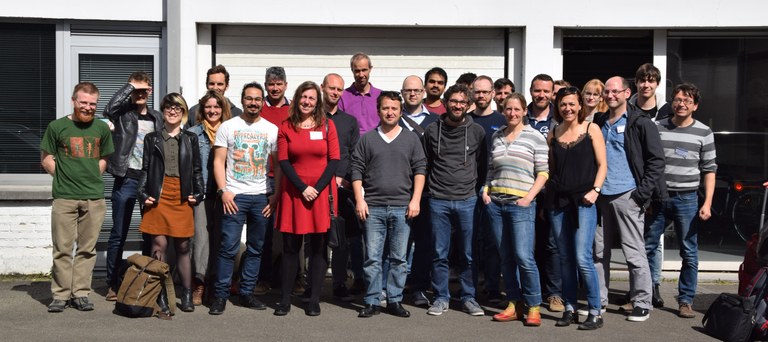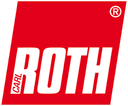ALPAGA workshop - Genome evolution in asexual organisms
Get the abstract book.
Please contact us if you need more information: secretariat.adre@unamur.be
The scientific committee
- Karine Van Doninck, UNamur, Belgium: organizer
- Bernard Hallet, Université Catholique de Louvain, Belgium
- Jean-François Flot, Université Libre de Bruxelles, Belgium
- Etienne Danchin, INRA Sophia Antipolis, France: coordinator ALPAGA I
- Tanja Schwander, Université de Lausanne, Switzerland
The context
Although the question of evolutionary advantages of sexual reproduction has remained unresolved for several decades, important advances have been made over the last years, thanks to Next Generation Sequencing technologies, sophisticated computational tools, extensive phylogenetic information and new statistical methods for testing evolutionary hypotheses via comparative genomics. Genomic data have offered great opportunities to test effects of sexual vs asexual reproduction on patterns of genome structure, genetic diversity and molecular evolution. Genomic tools have also been used to detect the occurrence of sexual reproduction and confirm/invalidate the status of putatively ancient asexual clades. Finally, the newly available complete genome sequences of obligately asexual organisms, especially of an ancient asexual bdelloid rotifer (Flot et al. 2013; Nature 500:453-457) and of the asexual nematode Meloidogyne incognita (Abad et al. 2008; Nature Biotech 26:915-921), enabled the identification of unique genomic peculiarities in asexual lineages.
In 2014 European researchers came together at the University of Lausanne to set-up an international consortium to study the evolutionary genomics of asexual species, with as first initiative the submission of a grant application to France Génomique. The project, entitled ALPAGA (Asexual Lineages and Populations of Animals: a Genomic Analysis) submitted to France Génomique, got granted and started in March 2016. It is a large-scale sequencing project spanning several European laboratories and focusing on a diversity of asexual organisms and their sexual counterparts.
The workshop
 It is therefore timely, at the start of this project, to organize a scientific meeting to reunite all the researchers of ALPAGA to coordinate the research efforts and discuss the different workpackages outlined within the project. In addition keynote speakers in the field, who have recently published groundbreaking results, are also invited to present their latest results and provide new and critical insights into the project ALPAGA.
It is therefore timely, at the start of this project, to organize a scientific meeting to reunite all the researchers of ALPAGA to coordinate the research efforts and discuss the different workpackages outlined within the project. In addition keynote speakers in the field, who have recently published groundbreaking results, are also invited to present their latest results and provide new and critical insights into the project ALPAGA.
This scientific workshop is also open to PhD students and postdoctoral researchers of Belgian Universities.
The ALPAGA workshop was Supported by
 |  |
|
|
|---|
Program
Tuesday, March 28th |
Location: ADRE, NARC room, 55 rue de Bruxelles |
|---|
|
14h30-15h00 |
Arrivals – welcome package |
|
15h00 |
Welcome and Introduction – Karine Van Doninck (host at UNamur) |
|
Session 1: Asexual evolution: rare or common? – Chairman: Karine Van Doninck |
|
|
15h15-16h00 |
Local recombination suppression in an asexual springtail? Ken Kraaijeveld (Vrije Universiteit Amsterdam, NL) |
|
16h00-16h45 |
Automixis in Daphnia: A model for the evolution of clonality? Christoph Haag (CEFE-CNRS Montpellier, FR) |
|
16h45-17h30 |
Contagious asexuality in Artemia Thomas Lenormand (CEFE-CNRS Montpellier, FR) |
|
17h30-18h30 |
Belgian beers : informal discussions |
|
18h30-19h30 |
Check-ins at the different hotels or B&B in Namur |
|
19h45 |
Dinner at the Grill des Tanneurs (35€ drinks included) |
Wednesday, March 29th |
Location: B&LC, Agora Hall, rue Godefroid, 5 |
|---|
|
Session 2: Evolutionary adaptation in asexuals – Chairman: Bernard Hallet |
|
|
9h00-9h45 |
Adaptive genome evolution in an asexual fungal plant pathogen Michael F Seidl (Wageningen University & Research, NL) |
|
9h45-10h30 |
Evolutionary genomics of asexual fungi plant pathogens Ronnie de Jonge (Utrecht University, NL) |
|
Coffee – tea break |
|
|
11h00-11h45 |
Gene expression and evolutionary rate changes after parallel evolution of asexuality in stick insects Tanja Schwander (Université de Lausanne, Switzerland) |
|
11h45-12h30 |
C-value paradox revisited: Why is there so much intraspecific genome size variation in the monogonont rotifer Brachionus asplanchnoidis, and what are the consequences? Claus-Peter Stelzer (Universität Inssbruck, AU) |
|
Lunch break |
|
|
Session 3: Asexuality with hybridization – Chairman: Tanja Schwander |
|
|
13h30-14h15 |
Unorthodox reproductive systems in Cataglyphis desert ants Serge Aron (Université Libre de Bruxelles, BE) |
|
14h15-15h00 |
Androgenesis in the Asian clam genus Corbicula Lise-Marie Pigneur (UNamur, Universite de Liège, BE) |
|
Coffee – tea break |
|
Session 4: Ancient asexual scandals: do they exist and how do they persist? – Chairman: Jean-François Flot
|
15h30-16h |
Phylogenetic and genomic studies of ancient asexual darwinulid ostracods Isa Schön (Royal Belgian Institute of Natural Sciences, BE) |
|
16h-16h30 |
Horizontal gene transfers among asexual bdelloid rotifers of the genus Adineta Nicolas Debortoli (Université de Namur, BE) |
|
16h30-17h |
Hybridization and polyploidy enable genomic plasticity without sex in the asexual root-knot nematodes Etienne Danchin (INRA – Sophia Antipolis, FR) |
|
17h-17h30 |
Recent insights into ancient asexual mites Jens Bast (Université de Lausanne, Switzerland) |
|
17h30-19h |
Aperitif during a boat trip around Namur followed by a dinner on board: informal discussions |
Thursday, March 30th |
Location: B&LC, Agora Hall, rue Godefroid, 5 |
|---|
|
Session 5: New tools to improve the assembly of heterozygous genomes – Chairman: Etienne Danchin |
|
|
9h00-9h30 |
Assembling heterozygous/polymorphic genomes: challenges and solutions Jean-François Flot (Université Libre de Bruxelles, BE) |
|
9h30-10h00 |
BWISE: DBG-guided super-read assembly Antoine Limasset (INRIA Rennes, FR) |
|
10h00-10h30 |
Alienomics Jitendra Narayan (Université de Namur, BE) |
|
Coffee – tea break |
|
|
11h00-11h30 |
Oxford Nanopore technology : data and applications Jean-Marc Aury (Genoscope, France) |
|
11h30-12h00 |
Horizontal gene transfer – population genomic approach in bdelloid rotifers Marie Cariou (Université de Namur, BE) |
|
12h-12h20 |
ALPAGA I: aim and objectives Etienne Danchin (coordinator ALPAGA, INRA – Sophia Antipolis, FR) |
|
12h20-12h40 |
ALPAGA II: aim and objectives |
|
Lunch break till 14h30: final discussions and ALPAGA perspectives |
|













